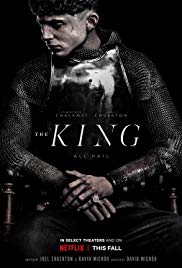A review of a film from the British Film Institute’s London Film Festival, 2019 – The King – based on Shakespeare’s Henriad.

The King
Friday, 4th October 2019 (afternoon)
My BFI London Film Festival 2019 odyssey began with a historical drama…
I’ll state right up front that there are a number of reasons why I am going to have difficulties in reviewing a new version of the Henriad. Firstly, Kenneth Branagh’s epic, Henry V (1989), is one of my favourite films and I know that I’m not going to be able to avoid comparisons. Secondly, as a graduate of the Royal Central School of Speech and Drama‘s MA in Classical Acting, I’m also going to struggle with the loss of Shakespeare’s text (although, there will no doubt be many who welcome the modernisation). Finally, there is a more personal reason why I may find historical inaccuracies difficult to bear but I’ll discuss that at the end.
The startling transformation undertaken by Hal in Shakespeare’s ‘Henriad series’ (Henry IV, Parts 1 & Part 2, & Henry V), from the fun-loving ‘party prince’ into the warrior monarch, is one of literature’s most interesting character arcs. Thus, you cannot blame David Michôd and his co-screenwriter and star, Joel Edgerton, for wanting to have a go at adapting the texts but it’s a bold move to take on the Bard and, in key moments (not least, the King’s rousing speech at Agincourt) they simply pale by comparison.
Despite, on the surface seeming to be a new take on Henry, this film really ought to be called ‘The Rehabilitation of Sir John Falstaff’. Falstaff was one of Shakespeare’s most beloved characters (so much so that, like Conan Doyle with Sherlock, Shakespeare was forced to bring him back to life, after killing him off, by the character’s adoring fans) and it is one of Shakespeare’s cruellest moments when he dismisses Falstaff with, ‘I know thee not, old man.’
In this version, however, Falstaff is not dismissed when Hal becomes king but is, instead, made ‘Grand Marshall of the Army’, single-handedly forming the battle plan that wins Agincourt for England. I love Falstaff as a character but there is little of the pomposity or grandiose lies of the Shakespearean counterpart (there is no sign of the ‘epic of Gad’s Hill’), instead, Edgerton offers us a warrior, whose drinking masks the pain of past battles. Apparently, Sir John is a veteran of fighting for Richard II, which presumably means he was against Henry’s father, which further explains his outcast state and the suspicion of the other war lords. Edgerton’s take, then, is an interesting one but oddly divorced from the source material.
If Falstaff is metamorphosed, so too, sadly, is the connection to reality. Unfortunately, there are numerous historical inaccuracies – technically, the English were already withdrawing to Calais, when they were surprised by the French at Agincourt, not pressing forward in their campaign, as the film suggests. There is also an absurd subplot suggesting that Henry was somehow manipulated into his campaign, despite the fact that it was clearly a calculated strategy to turn his war-like nobles from civil war towards a common cause (i.e. the conquest of France). Indeed, Henry had been negotiating with the French over his rightful claims for some time before going to war. I was sad to be reminded that Henry’s personal order of the execution of the French prisoners after the battle is on point (although, in fairness, Henry was concerned that they might re-group and attack) but I doubt it would have been made in quite so glib a manner.
As Henry, Chalamet reminds us that he is a superb actor – his range and versatility evident in his turns as the youth pursuing an older man in Call Me By Your Name and as the young drug addict in Beautiful Boy – but his emotions are a little stunted here, behind the steely authoritarianism of the king. Branagh’s Henry, despite (or perhaps because of) the Shakespearean language is much more rounded a character and, to my mind, soars to far greater emotional depths. Nonetheless, Chalamet is never less than a mesmerising presence.
As for the other members of the cast, I would like to have seen a little more of Ben Mendelsohn’s ailing Henry IV, since it proves that he can do more than play identikit villains (cf his turns in Rogue One, Ready Player One, etc). Robert Pattinson also has great fun as the louche Dauphin, heir to the French throne, but his role in these historical events is ridiculous (hint: the Dauphin wasn’t at the Battle of Agincourt).
I’ll tell you who was at the Battle of Agincourt, however – a certain ‘Richard Waller’. Waller imprisoned one of the French generals, Charles d’Orléans, the Duke of Orléans, and was knighted on the battlefield for his actions by the King. Maybe that’s why I am a bit critical of any historical inaccuracies, because my ancestor is on my mind?
All in all, despite its flaws, The King was an epic start to the festival.
Dir David Michôd
Prod David Michôd, Joel Edgerton, Brad Pitt, Dede Gardner, Jeremy Kleiner, Liz Watts
Scr Joel Edgerton, David Michôd
With Timothée Chalamet, Joel Edgerton, Sean Harris, Robert Pattinson, Lily-Rose Depp
UK-Hungary-Australia
2019
134min
UK Distribution Netflix

